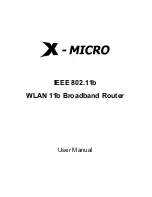
ACL Commands
permit (IP)
Cisco 220 Series Smart Plus Switches Command Line Interface Reference Guide Release 1.0.0.x
80
4
Parameters
•
sequence
value
—(Optional) Specifies the sequence number for the IPv4-
based ACL. The acceptable range is from 1 to 2147483547. If not specified,
the switch provides a number starting from 1 in ascending order.
•
protocol
—The name or the number of an IP protocol. Available protocol
names are icmp, ip, tcp, egp, igp, udp, hmp, rdp, idpr, ipv6, ipv6:rout,
ipv6:frag, idrp, rsvp, gre, esp, ah, ipv6:icmp, eigrp, ospf, ipinip, pim, l2tp, and
isis. To match any protocol, use the
IP
keyword. (Range: 0 to 255)
•
source
—Source IP address of the packet.
•
source-wildcard
—Wildcard bits to be applied to the source IP address.
•
source-port/port-range
—(Optional) The UDP or TCP source port.
Predefined port names are defined in the
destination-port/port-range
parameter. (Range: 0 to 65535)
•
destination
—Destination IP address of the packet.
•
destination-wildcard
—Wildcard bits to be applied to the destination IP
address.
•
destination-port/port-range
—(Optional) The UDP or TCP destination port.
You can enter a range of ports by using hyphen such as 20 - 21. For TCP
enter a number or one of these values: bgp (179), chargen (19), daytime (13),
discard (9), domain (53), drip (3949), echo (7), finger (79), ftp (21), ftp-data
(20), gopher (70), hostname (42), irc (194), klogin (543), kshell (544), lpd
(515), nntp (119), pop2 (109), pop3 (110), smtp (25), sunrpc (1110, syslog
(514), tacacs-ds (49), talk (517), telnet (23), time (35), uucp (117), whois (43),
www (80). For UDP enter a number or one of the following values: biff (512),
bootpc (68), bootps (67), discard (9), dnsix (90), domain (53), echo (7),
mobile-ip (434), nameserver (42), netbios-dgm (138), netbios-ns (135),
on500-isakmp (4500), ntp (123), rip (520), snmp (161), snmptrap (162),
sunrpc (111), syslog (514), tacacs-ds (49), talk (517), tftp (69), time (35), who
(513), or xdmcp (177). (Range: 0 to 65535)
•
dscp
number
—(Optional) Specifies the DSCP value.
•
precedence
number
—(Optional) Specifies the IP precedence value.
•
icmp-type
—(Optional) The ICMP message type for filtering ICMP packets.
Enter a number or one of these values: echo-reply, destination-unreachable,
source-quench, redirect, alternate-host-address, echo-request, router-
advertisement, router-solicitation, time-exceeded, parameter-problem,
timestamp, timestamp-reply, information-request, information-reply,
















































